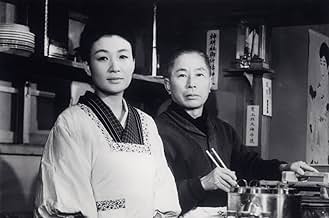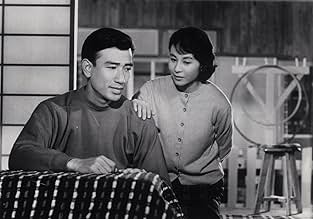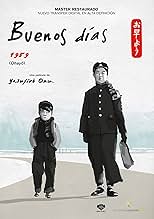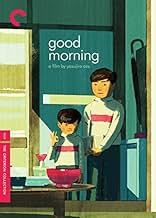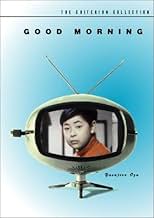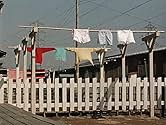AVALIAÇÃO DA IMDb
7,8/10
12 mil
SUA AVALIAÇÃO
Duas crianças iniciam uma greve de silêncio para pressionar seus pais a comprarem uma televisão.Duas crianças iniciam uma greve de silêncio para pressionar seus pais a comprarem uma televisão.Duas crianças iniciam uma greve de silêncio para pressionar seus pais a comprarem uma televisão.
- Direção
- Roteiristas
- Elenco e equipe completos
- Produção, bilheteria e muito mais no IMDbPro
Avaliações em destaque
"Good Morning" (Japanese, 1959): Directed by Ozu. As in all of his films, Tokyo is the stage, and he populates them with his usual team of actors. Think of the professional stability of Ingmar Bergman, Woody Allen, or John Waters, but Japanese. Ozu concentrates on small moments made meaningful. Unlike the quiet, black and white drama "Tokyo Story", this later film (in color) is a gentle comedy about how people build the character of each and every day with the smallest of gestures which is this case is brought to our attention by two small brothers who decide to go "on strike" insisting that their Father get a television for the household. It's a loving, funny, and forgiving look at how silly we all can be.
Ozu's films always balance humour, heartbreak and social comment - in this film the balance is decidedly in favour of humour. Its hard to imagine a slighter story to build a full movie - two little boys who decide not to speak for a few days in a huff over being denied a TV. But Ozu builds a whole world out of this dull little suburb in a Japan just getting on its feet after the war and embracing consumerism as an alternative to..... well, whatever went before.
I think only Ozu could make boring mass produced housing look so utterly gorgeous in full colour, and the minor bickering of the household ladies seem so important. He's helped by a fantastic cast, especially the child actors playing the little boys (oddly enough, there doesn't seem to be any little girls in this suburb). The story has layer up layer of irony (aided by numerous fart jokes) built up upon its slight foundations making an utterly fascinating film. As usual with Ozu, he doesn't lecture, although as always his sympathy is slightly tilted to the somewhat bemused father figures. Even the simple ending, a shot of laundry fluttering on a line, seems somehow laden with meaning. The whole film is a pure delight.
I think only Ozu could make boring mass produced housing look so utterly gorgeous in full colour, and the minor bickering of the household ladies seem so important. He's helped by a fantastic cast, especially the child actors playing the little boys (oddly enough, there doesn't seem to be any little girls in this suburb). The story has layer up layer of irony (aided by numerous fart jokes) built up upon its slight foundations making an utterly fascinating film. As usual with Ozu, he doesn't lecture, although as always his sympathy is slightly tilted to the somewhat bemused father figures. Even the simple ending, a shot of laundry fluttering on a line, seems somehow laden with meaning. The whole film is a pure delight.
While somewhat lighter than most of Ozu's features, this is still a rather perceptive film that is also entertaining to watch. The situation and the characters are all straightforward, yet Ozu's expert eye sees plenty of things worth considering, and each simple story development has a purpose. If the material remains generally lightweight when compared to some of his other movies, it still has the same thoughtful, low-key touch and genuinely human characters.
The young boys drive much of the story in this one, and they are very believable, whether in their petulant responses to parental authority or in their schoolboy fads. Some of the latter can be slightly off-putting at times, but then such things do rather ring true with the nature of boys at that stage of their lives.
The cast is quite large, so that none of the characters gets a lot more screen time than any of the others, yet somehow all of them not only come alive, but get some defining moments. Most of the adult characters are simple, yet easy to care about, and there are several good performances. The grandmother character and the aunt of the two brothers are probably the most interesting of the characters, yet all of them have a purpose.
As is usually the case with Ozu's movies, you can watch it a second time and see additional detail in the characters' relationships and dialogue. This time, the issues involved are not as significant as usual, yet the simple plot provides some insights into the ways that families and neighbors communicate with one another and understand one another. It's probably more entertaining than enlightening, but yet there is some substance as well.
The young boys drive much of the story in this one, and they are very believable, whether in their petulant responses to parental authority or in their schoolboy fads. Some of the latter can be slightly off-putting at times, but then such things do rather ring true with the nature of boys at that stage of their lives.
The cast is quite large, so that none of the characters gets a lot more screen time than any of the others, yet somehow all of them not only come alive, but get some defining moments. Most of the adult characters are simple, yet easy to care about, and there are several good performances. The grandmother character and the aunt of the two brothers are probably the most interesting of the characters, yet all of them have a purpose.
As is usually the case with Ozu's movies, you can watch it a second time and see additional detail in the characters' relationships and dialogue. This time, the issues involved are not as significant as usual, yet the simple plot provides some insights into the ways that families and neighbors communicate with one another and understand one another. It's probably more entertaining than enlightening, but yet there is some substance as well.
It may have the skimpiest of plots--two young brothers take a vow of silence until their parents buy them a television--but Yasujiro Ozu's 1959 picture is anything but slight, taking on the subject of language (ironic, considering the story) with attentiveness and intelligence. In his deliberate, contemplative manner, Ozu presents a wry commentary on the ways even the most innocuous words can harm (gossip) or become the building blocks of a relationship (a budding romance is confirmed by a conversation about the weather); he also notes Japan's growing fascination with the English language (the older boy studies it) and the increasing obsession, now with fourteen years of distance from the war, with American technology--the suburban landscape is peppered with aerial antennas as television begins to permeate the culture. It's subtly beautiful: each shot is perfectly framed (the camera never moves) with an excellent use of depth that highlights exactly what the director wants you to see and giving you plenty of space to focus; it's easy to see how a master of today's Asian cinema such as Wong Kar-Wai would be profoundly influenced by Ozu's languid yet carefully observed filmmaking. A delight; it's also a fine introduction for younger viewers to the magnificence of international cinema.
"Good Morning," is one of my favorite's films.
It means a lot to me personally, because -like all of Ozu's work- it demonstrates a brilliant understanding of the complexities of being human. It contains simple wisdom, humour, and kindness; and sadly the whole of cinema history has provided us with very few films which can make such a claim. Ozu celebrates the beauty of middle-class existence, all the while delivering a profound criticism of our tendency to permit "small talk" to dominate conversations. Ultimately though, it is the humour which makes "Good Morning" my favorite's Ozu picture, for it is a very funny movie. Very funny and very satisfying! I can hardly imagine an open-minded person not enjoying it.
Because many North American viewers have a reluctance to watch films more than a few years old, or in languages other than English, Ozu's exposure here is still extremely limited. That is unfortunate because Ozu's films are quite universal.
I feel confident that anyone could appreciate Ozu's genius in this film.
It means a lot to me personally, because -like all of Ozu's work- it demonstrates a brilliant understanding of the complexities of being human. It contains simple wisdom, humour, and kindness; and sadly the whole of cinema history has provided us with very few films which can make such a claim. Ozu celebrates the beauty of middle-class existence, all the while delivering a profound criticism of our tendency to permit "small talk" to dominate conversations. Ultimately though, it is the humour which makes "Good Morning" my favorite's Ozu picture, for it is a very funny movie. Very funny and very satisfying! I can hardly imagine an open-minded person not enjoying it.
Because many North American viewers have a reluctance to watch films more than a few years old, or in languages other than English, Ozu's exposure here is still extremely limited. That is unfortunate because Ozu's films are quite universal.
I feel confident that anyone could appreciate Ozu's genius in this film.
Você sabia?
- CuriosidadesYasujirô Ozu: [movie posters] Yasujirô Ozu pays tribute to his cinematic influences by putting all kinds of film posters all over the wall in his films. In this movie, there are two posters, one of Acorrentados (1958) (at 08:30) and one of Amantes (1958) (at 08:07), both at the neighbors' house.
- Versões alternativasThe original American theatrical release prints were in black and white.
- ConexõesFeatured in Transcendental Style and Flatulence (2017)
Principais escolhas
Faça login para avaliar e ver a lista de recomendações personalizadas
- How long is Good Morning?Fornecido pela Alexa
Detalhes
Contribua para esta página
Sugerir uma alteração ou adicionar conteúdo ausente



